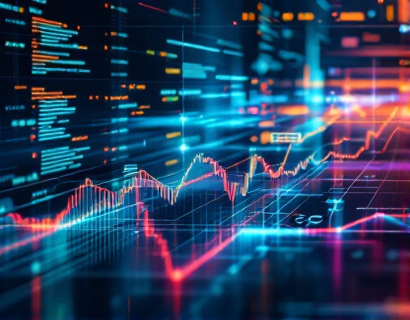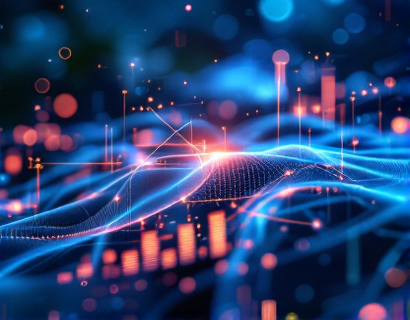Revolutionizing Productivity in the Digital Age: The Convergence of Crypto and AI
The digital age has ushered in a new era of technological advancements, where the integration of cryptocurrency and artificial intelligence (AI) is redefining productivity and efficiency. This convergence is not just a trend but a transformative shift that is unlocking unprecedented possibilities for individuals and businesses alike. As we delve into this fascinating intersection, it's essential to understand how these technologies are synergistically enhancing various aspects of our digital lives.
The foundation of this revolution lies in the unique properties of cryptocurrency, which offer decentralized, secure, and transparent transactions. When combined with the computational power and learning capabilities of AI, the potential for innovation becomes immense. This article explores how this synergy is creating advanced applications and services that simplify daily tasks and connect tech enthusiasts with the latest digital innovations.
Enhancing Security and Trust
One of the most significant benefits of integrating cryptocurrency with AI is the enhancement of security and trust in digital transactions. Traditional systems often rely on centralized authorities to verify and secure data, making them vulnerable to breaches and fraud. Cryptocurrency, with its decentralized nature, eliminates the need for intermediaries, reducing the risk of single points of failure. AI, on the other hand, can detect and prevent anomalies in real-time, further fortifying the security framework.
For instance, AI-driven algorithms can analyze patterns in transaction data to identify potential fraudulent activities. These algorithms learn from past incidents and adapt to new threats, ensuring that the system remains robust against evolving risks. This combination not only protects user data but also builds trust in digital platforms, encouraging more widespread adoption.
Streamlining Administrative Tasks
The administrative burden of managing digital assets and services can be overwhelming. Traditional methods often involve manual processes that are time-consuming and prone to errors. The integration of AI with cryptocurrency streamlines these tasks, making them more efficient and accurate. Smart contracts, a key application of blockchain technology, automate and enforce contractual obligations without the need for intermediaries.
AI can optimize the execution of smart contracts by analyzing conditions and executing actions based on predefined criteria. This automation reduces the need for human intervention, saving time and resources. For businesses, this means faster transaction processing, reduced operational costs, and increased productivity. For individuals, it means a more seamless and hassle-free experience when managing digital assets.
Personalized User Experiences
AI's ability to process and analyze vast amounts of data makes it an ideal tool for creating personalized user experiences. In the context of cryptocurrency and digital services, AI can tailor recommendations, notifications, and interfaces to individual preferences and behaviors. This level of personalization enhances user engagement and satisfaction, making digital platforms more intuitive and user-friendly.
For example, a digital wallet powered by AI can learn a user's spending habits and suggest optimal times for transactions to minimize fees or maximize rewards. It can also provide real-time alerts for unusual activity, ensuring that users are always informed and in control of their digital assets. This personalized approach not only improves the user experience but also fosters a deeper connection between users and the platforms they interact with.
Innovative Financial Solutions
The convergence of cryptocurrency and AI is giving rise to innovative financial solutions that were previously unimaginable. Decentralized finance (DeFi) platforms, for instance, leverage AI to offer a wide range of financial services such as lending, borrowing, and trading, all without traditional financial intermediaries. These platforms use AI to assess creditworthiness, manage risk, and optimize portfolio performance.
AI-driven algorithms can analyze market trends and predict price movements with greater accuracy, providing users with valuable insights for informed decision-making. This democratization of financial services makes high-quality financial tools accessible to a broader audience, breaking down barriers and promoting financial inclusion.
Enhancing Supply Chain Management
Supply chain management is another area where the combination of cryptocurrency and AI is making a significant impact. The transparency and traceability offered by blockchain, combined with AI's predictive analytics, can optimize supply chain operations. AI can monitor and analyze data from various points in the supply chain, identifying bottlenecks, predicting delays, and optimizing logistics.
Cryptocurrency facilitates seamless and secure transactions between different stakeholders, reducing the need for paper-based documentation and speeding up the process. Smart contracts can automate payments and ensure compliance with contractual terms, further streamlining operations. This integration not only improves efficiency but also reduces costs and enhances trust among supply chain partners.
Boosting Internet of Things (IoT) Applications
The Internet of Things (IoT) is transforming the way we interact with the physical world, and the integration of cryptocurrency and AI is taking this transformation to the next level. IoT devices generate vast amounts of data that need to be processed and analyzed in real-time. AI algorithms can handle this data efficiently, extracting meaningful insights and enabling smart decisions.
Cryptocurrency plays a crucial role in incentivizing IoT device operators and ensuring secure data transactions. For example, IoT devices can be rewarded with cryptocurrency for providing valuable data, creating a decentralized network of data providers. AI can further enhance this network by optimizing data flow, ensuring that only relevant and high-quality data is shared. This synergy not only boosts the performance of IoT applications but also opens up new revenue streams.
Empowering Creators and Content Producers
The creative industry is witnessing a paradigm shift with the advent of cryptocurrency and AI. Digital content creators can leverage these technologies to monetize their work more effectively. Blockchain-based platforms ensure that creators receive fair compensation for their content, while AI can help in content creation, curation, and distribution.
AI-driven tools can analyze audience preferences and generate tailored content recommendations, increasing engagement and reach. Smart contracts can automate royalty payments, ensuring that creators are compensated for each use of their work. This combination not only empowers creators but also enriches the user experience by providing high-quality, relevant content.
Challenges and Considerations
While the potential of integrating cryptocurrency and AI is vast, there are several challenges and considerations that need to be addressed. Regulatory frameworks are still evolving, and the legal status of cryptocurrencies varies across jurisdictions. Ensuring compliance and navigating regulatory landscapes is crucial for the sustainable growth of these technologies.
Another challenge is the technical complexity involved in integrating AI with blockchain systems. Developing robust and scalable solutions requires expertise in both domains. Additionally, there is a need for greater public awareness and education to foster trust and adoption. Addressing these challenges will be essential for realizing the full potential of this technological convergence.
Conclusion
The integration of cryptocurrency and AI is revolutionizing productivity in the digital age, offering advanced applications and services that simplify daily tasks and connect tech enthusiasts with the latest innovations. From enhancing security and streamlining administrative tasks to enabling personalized experiences and innovative financial solutions, the possibilities are endless. As this field continues to evolve, it is crucial to stay informed and adapt to the changing landscape, embracing the transformative power of these technologies.










































